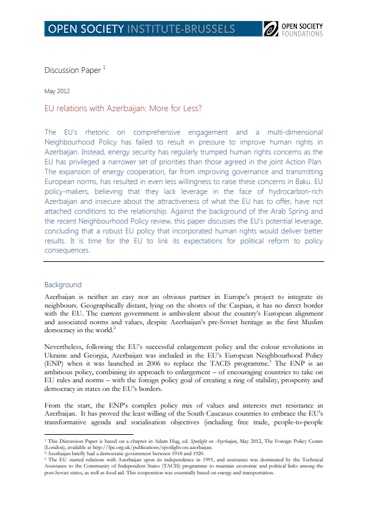A New Narrative for Europe
By Jacqueline Hale
Few could dispute the Nobel committee's assessment that the European Union has helped to turn a continent of war into a continent of peace.
Many, however, debated whether the committee was right to award the prize to the EU at a time of financial crisis and growing unease about its commitment to solidarity, democracy and justice both inside and outside the Union's borders.
Add to this the reality that for 96 million Europeans under the age of 30, the peace narrative has little personal resonance and one begins to see the legitimacy gap the EU is facing.
Previous attempts to codify a European idea, notably the constitution for Europe, have foundered among infighting between member states and failed to ignite the ambition of European citizens.
But viewed from beyond its borders Europe as an idea begins to take clearer shape.
For outsiders, Europe represents more than a project for peace. Europe is about values: human rights and democracy, as well as freedom and prosperity. The sum total of this narrative is why 10 nations joined in 2004, transforming themselves in the process, and why others (Iceland, Croatia and Turkey) wait in line to become members.
Still others in the EU's neighbourhood, from Georgia and Moldova to distant Kazakhstan, have given voice to their aspirations to a European idea.
Even at this moment of turmoil, other nations and peoples still look to Europe because of its standards, from human rights to the quality of air, water and food, as well as its commitment to social inclusion.
Azerbaijani champions of freedom of expression and pro-democracy activists from Burma to Belarus cite European standards as the benchmarks by which they wish to hold their governments to account.
Where they can, activists evoke the non-EU body, the Council of Europe's Convention on Human Rights and seek remedy at its court in Strasbourg.
Those beyond the EU’s gravity zone and the court's jurisdiction look to the European Union External Action Service to turn its extensive human rights rhetoric into concerted political action where abuses occur.
Yet for a new European "narrative" to stick it must amount to more than words.
Too often in the past rhetoric did not match reality. Critics from Tunis to Tahrir Square were quick to point out how Europe embraced dictators for strategic reasons at the same time as it extolled the virtues of democracy and human rights.
Within the EU's borders recent years have witnessed a retreat from European values as rising populism and a lack of solidarity between and within EU member states have resulted in gains for xenophobic nationalist parties, as well as specific policies targeting minority groups, notably France's expulsion of Roma.
To be meaningful, a narrative delivered to EU's partners must be practised and enforced at home.
The EU needs to have coherent policies and mechanisms at its disposal to check attempts by governments to roll back rights and concentrate power, such as Hungary's assault on the judiciary, or efforts by xenophobic movements such as the National Front to shore up the walls of fortress Europe by playing on the fears of citizens.
To avoid being defined by others, a European idea needs backing first and foremost from its population, reaching beyond the policy elites and their salons of power.
If the EU is to make the most of its democracy and human rights narrative, it must first build a system of domestic accountability in which citizens can place their trust.
EU elites in Brussels and national capitals have practised peace for half a century behind closed doors, through carefully balanced compromises which have edged the project forward.
Now the elites—be they elected or appointed officials, or in the media and civil society—have a responsibility to give the project back to European citizens.
A new "human rights and democracy" narrative that underscores the EU's achievements but is honest about where there is room for improvement will be more likely to succeed in reconnecting with the European street.
If it is backed by policies targeting rights violations on Europe's doorstep as well as perceived accountability failings at the supranational (EU) level, it will do something of what the peace narrative achieved in its early days: wresting power from those who foster divisions and conflict by their hate narratives, and offering people a positive vision for overcoming day-to-day injustices and for securing their children's future.
This article was originally published by EU Observer.
Until October 2013, Jacqueline Hale was responsible for managing work relating to Central Asia and South Caucasus, energy, and human rights issues at the Open Society European Policy Institute.


